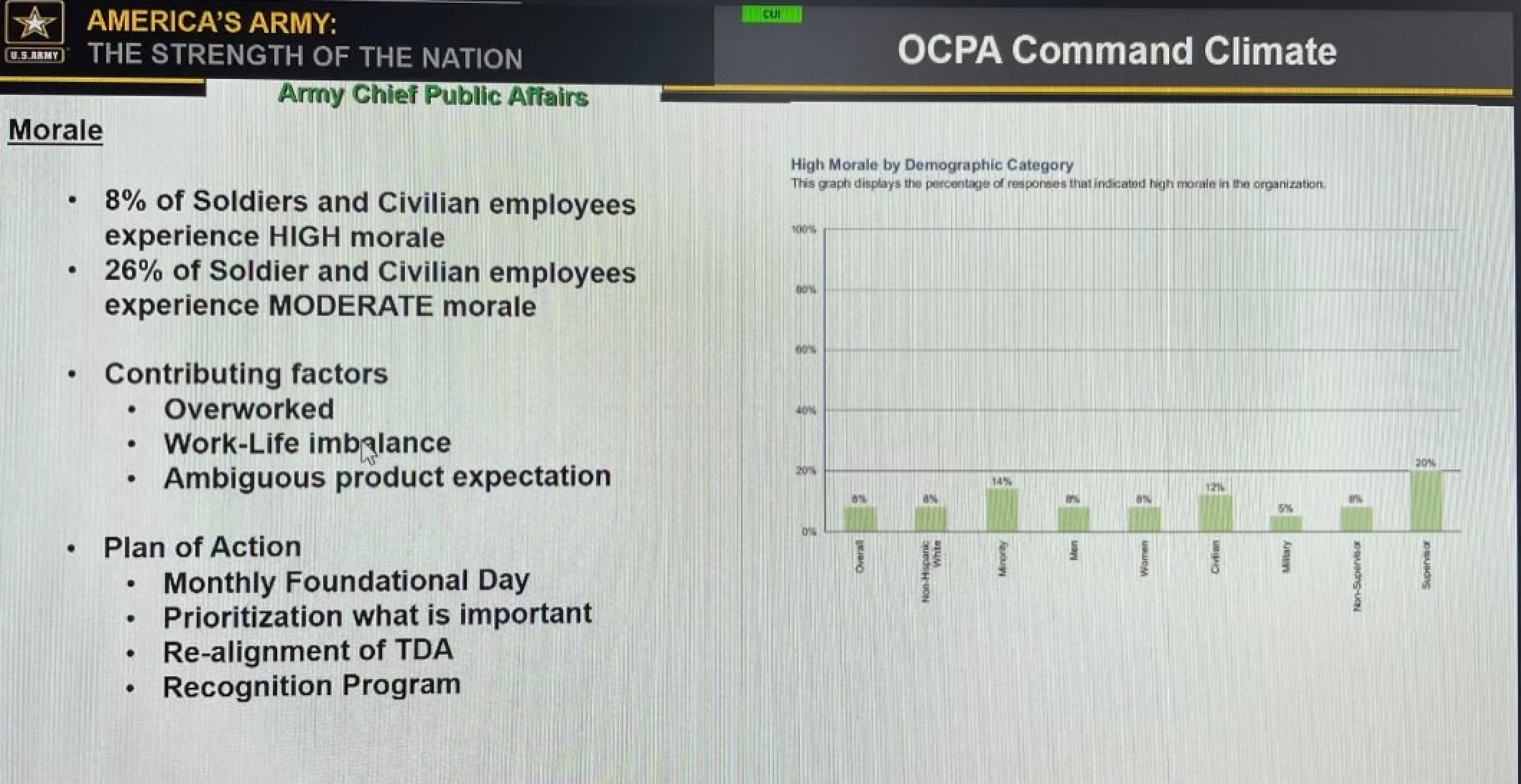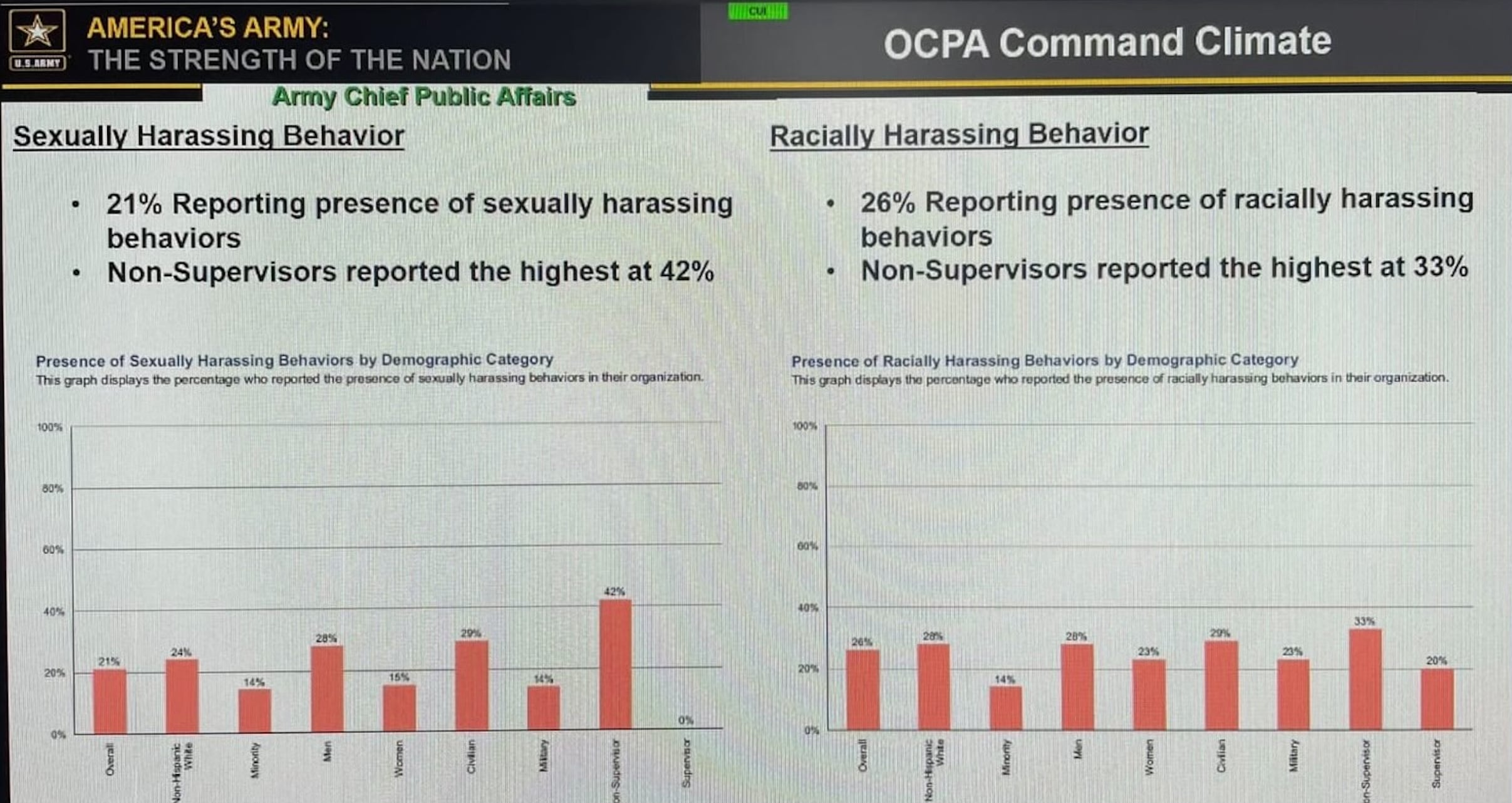The Army’s highest-ranking public affairs officer and top spokesperson has been suspended from her duties after 97 percent of respondents to a command climate survey for her office reported “workplace hostility.”
Brig. Gen. Amy E. Johnston took over as the service’s chief of public affairs in April 2019, according to her official biography.
In that role, she is “responsible for all communications activities involving the United States Army” and she serves as the principal public affairs advisor to the Army secretary and chief of staff.
Army Times obtained slides detailing a recent command climate survey that revealed massive dissatisfaction within the Office of the Chief of Public Affairs. A source familiar with the suspension said it was related to the survey, which has sparked an Army investigation.
An Army spokesperson confirmed that Johnston was no longer in her position, but said she could not provide details about the pending investigation or comment on the survey.
“We can confirm that Brig. Gen. Amy Johnston has been suspended and placed on special duty pending the outcome of an Army investigation,” said Army spokesperson Cynthia Smith. “Given that the investigation is ongoing, we can provide no further comment at this time.”
Johnston did not immediately respond to a request for comment sent through her office.
Johnston’s suspension came in the wake of a command climate survey that revealed alarming conditions at OCPA.
Of the soldiers and Army civilians who responded to the survey, 97 percent reported “workplace hostility,” which is a key indicator of potential toxic leadership issues, according to the slides.
The data also revealed a morale crisis. Roughly two-thirds of soldiers and civilians at OCPA reported low morale in the survey, with only 8 percent saying they had high morale.

According to the briefing slides, spirits were low due to overwork, poor work-life balance and unclear expectations concerning work products.
The survey also revealed potential issues with sexual and racial harassment.
Twenty-one percent of respondents said there was sexual harassment present at OCPA, and 26 percent reported they’d seen racial harassment.
There have been other signs of dissatisfaction with Johnston’s leadership of OCPA, as well.
Johnston was named in the Army Regulation 15-6 investigation that looked into how the service handled Spc. Vanessa Guillén’s disappearance and murder.

The report, which uses her previous last name of Hannah, says she provided communications advice to Maj. Gen. Scott Efflandt, who was the highest ranking officer relieved in conjunction with the investigation.
The Fort Hood report criticized the post’s press shop for being “ill-staffed, ill-trained and ill-prepared” to deal with the social media environment during the Guillen case. Fort Hood public affairs ultimately fell under Johnston’s purview as the service’s ranking public affairs officer.
The investigation said the Army “ceded the social media space, lost the opportunity to inform and educate the public in a timely fashion, and allowed the unhindered growth of damaging narratives about Fort Hood and the Army.”
Army public affairs regulations, which Johnston is responsible for, lacked sufficient guidance on the topic at the time. A new version of the regulation that went into effect Nov. 8, 2020, included a chapter on social media, but it was too late.
Her office was also criticized in a June Task & Purpose report on the Army’s “failure to communicate.” The article quoted Army public affairs officers who said the service lacked transparency in dealing with news events.
Multiple Army public affairs officials also savaged the service’s strict public affairs regulations in the article, despite a significant overhaul last year that was designed to improve transparency.
“Most of the time we get it right,” Johnston told Task & Purpose in response to the criticism. “But sometimes we fall short; regardless, we will strive to do our best, and continue to do so, no matter what the challenge.”
It was not immediately clear who would serve as acting chief of public affairs during Johnston’s absence.
Davis Winkie covers the Army for Military Times. He studied history at Vanderbilt and UNC-Chapel Hill, and served five years in the Army Guard. His investigations earned the Society of Professional Journalists' 2023 Sunshine Award and consecutive Military Reporters and Editors honors, among others. Davis was also a 2022 Livingston Awards finalist.
Meghann Myers is the Pentagon bureau chief at Military Times. She covers operations, policy, personnel, leadership and other issues affecting service members.





